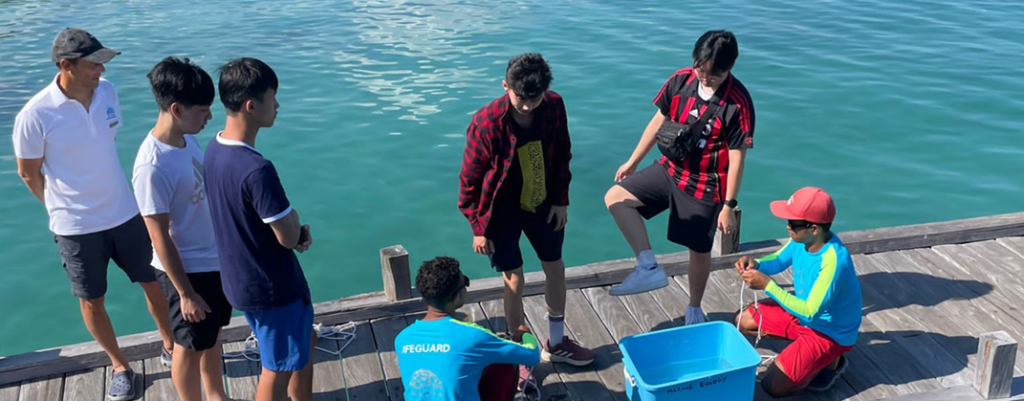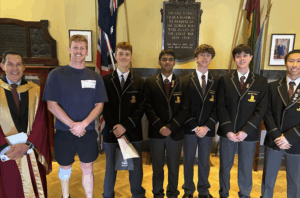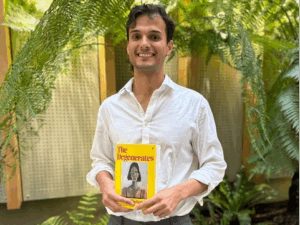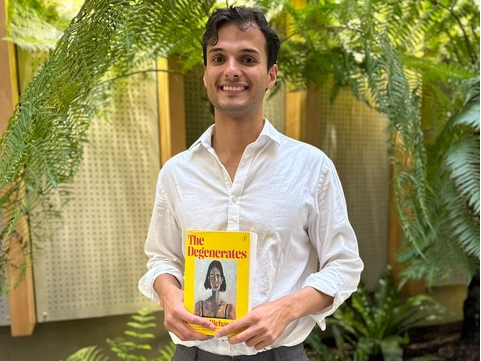Principal’s Report
Welcome back from term break. I trust we all have had the opportunity to spend some time resting and recalibrating for the next half of the year. This week has certainly started at full speed and I thank everyone for being ready to learn and ready to fully engage in the many activities that have been undertaken this week.
The power of experiential learning
I have stated on numerous occasions that not everything you learn will be gained via a textbook or classroom lesson. Much is learned through experiences gained through travel, work placements and opportunities to apply our learning in practical settings.
The Centre for Learning and Teaching at Boston University defines experiential learning as “an engaged learning process whereby students ‘learn by doing’ and reflecting on the experience…’
Our recent trip to Indonesia was certainly experiential.
Obviously, there was some downtime and the opportunity to buy a Bin Tang T shirt or two and some fake designer sunglasses, however, when it came to the serious part of the trip there was plenty of hands-on experience and time to reflect on it.

For example, we heard from British Marine Biologist Lee Miles on the topic of coral bleaching and then got into the water to do some coral planting and observe the impact of poor fishing practices and global warming on coral plantations. On another day we embarked on a six-hour bus trip to see first-hand how a small isolated rural village ekes out a modest existence from coffee plantations and fabric making, and on another day we trekked up a mountain to an eco-village to see how a community has developed a more sustainable way to build a business while at the same time ensuring the precious local flora and fauna are not adversely affected.
In each of these examples, I heard students comment on how much they valued these experiences. Additionally, I heard comments like – “at home, I can simply flush the toilet…at home you turn the tap on and you can drink the water…”
Our students are very capable, and many will make an impact in the communities they serve. I hope that additionally, through experiences such as these, our alumni will continue to live their lives in ways that will not only benefit them but also other communities, particularly those in developing countries. For example, through sustainable practices they adopt, environmental initiatives they develop or social enterprises they create.

Art Enterprise Project –understanding and developing the relationship between young people and arts participation
On Tuesday night, six teams of budding entrepreneurs engaged in a pitch event with the hope of getting financial support to take a product or service to market. Students were given the task of creating a product or service aimed at increasing arts participation among young people. The judges, Jon Michail, Deborah Halpern & Niv Dagan, three successful entrepreneurs, provided advice and feedback.
The winners were The CrateFellas –Year 10 students – Triet Huynh, Dravin Kahal, Alexander Lee and Jerry Lim.

Their project entitled SpiraBox – Art delivered to your door. SpiraBox provides subscribers with a box of different art materials each month. Additionally, the subscription provides subscribers with a social platform where they can engage with artists and users to provide resources and opportunities to exchange ideas. Our entrepreneurs and Big Brothers Big Sisters Leadership Council will now work with the winners to develop their project and get it to market.
Congratulations to all participants. Opportunities will be provided for unsuccessful participants to further develop their concepts. Additionally, all students will be encouraged to participate in further workshops and skill development activities.
Annual MHS and MHSOBA Inc. Careers Night – Thank you to all involved.
A sincere thank you to all involved including canteen staff and staff and student helpers. A specific note of thanks to Mr Bill Theodoropoulos, our Careers Coordinator and Ms Jo Malley, MHSOBA Inc Events Manager for coordinating the event.
Over 500 students and parents had the opportunity to meet with alumni from a range of fields, speak to university staff about their courses and attend a keynote from Professor Shanton Chang, School of Computing and Information Systems, The University of Melbourne.
Professor Chang’s presentation was very entertaining and incredibly informative, highlighting the importance of developing skills that will future proof students and ensure they can continue to pivot through changes in community and workforce requirements.
These include:
- Analysis and decision making
- Dealing with complexity and ambiguity
- Understanding the limitations and opportunities of methodologies and data.
These skills provide a valuable and necessary adjunct to the technical skills and knowledge obtained through academic programs of study.
Dr Tony Mordini
Principal





